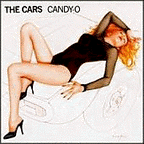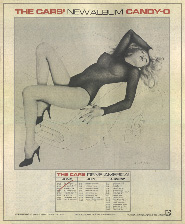![]()
 |

Candy-O
The Cars
Elektra 507
Released: June 1979
Chart Peak: #3
Weeks Charted: 62
Certified Platinum: 8/6/79
 It's almost inevitable that Candy-O, the Cars' second album, doesn't seem nearly as exciting as their first. The element of surprise is gone, and the band hasn't been able to come up with anything new to replace it. Candy-O is an elaborately constructed, lively, entertaining LP that's packed with good things. And it's got a wonderful title. But it's a little too disciplined, a shade too predictable. You never get the idea that these guys are going out on a limb, reaching for something dramatically beyond the safe borders of their proven appeal. Instead, there's a sense of relying on established devices, of shaping the songs to fit "the Cars sound," that's unusual in a group so young, and the record sounds familiar the first time you hear it. Candy-O is a good album that never remotely threatens to turn into a great one.
It's almost inevitable that Candy-O, the Cars' second album, doesn't seem nearly as exciting as their first. The element of surprise is gone, and the band hasn't been able to come up with anything new to replace it. Candy-O is an elaborately constructed, lively, entertaining LP that's packed with good things. And it's got a wonderful title. But it's a little too disciplined, a shade too predictable. You never get the idea that these guys are going out on a limb, reaching for something dramatically beyond the safe borders of their proven appeal. Instead, there's a sense of relying on established devices, of shaping the songs to fit "the Cars sound," that's unusual in a group so young, and the record sounds familiar the first time you hear it. Candy-O is a good album that never remotely threatens to turn into a great one.
On The Cars, the devices were already extensively worked out, but they weren't pat. There was always an element of risk, a hint that the whole careful structure might crack under the strain. Part of what made "Just What I Needed" so affecting was the listener's feeling that the band's emotions were running ahead of the music, outracing the singer's attempts to hold them back. And there were wonderful moments, as in "You're All I've Got Tonight," when the arty concept did give way, and rock & roll desperation took over. That doesn't happen here. Instead of loosening up, the Cars have opted for a chilly precision, refining their techniques until they're icily impeccable. The ironic romanticism is never allowed to be anything more than ironic, and the tone is always kept under immaculate control.
 Click image for larger view. |
In "Let's Go" (the single, and the best cut on the LP), Ocasek's ambivalence about his material does work. The driving hook seems to pull the singer into the song almost against his will, and the tiny pause between "When she says" and "let's go" illuminates the whole complex sense of attraction and alienation, danger and mystery, implied in this seduction. When the hook comes in again to take the singer away, you're caught up in the swirl of motion. Other moments are just as vivid. In "Nightspots," Greg Hawkes' synthesizer jabs and jumps like the flashing lights on a rainy, late-night highway, and the tune's hopped-up rhythms and stuttering singing have a tense, jittery momentum that's exactly right. And "Candy-O" itself is very nice, with some terse, churning guitar and a vocal just attenuated and yearning enough to make the heroine's coolness appear authentically felt instead of being merely presented.
"Since I Held You," "You Can't Hold On Too Long" and especially "Got a Lot on My Head" are all effective tracks. (On the entire record, only "Shoo Be Doo" lapses into arty contrivance and doesn't click on any level.) But even the finest songs are cast too evenly in the same mold. Since they're nearly all structured around a similar guitar-and-keyboards counterpoint, they tend to blur into each other. Despite the streamlined texture and the smoothly proficient playing, Candy-O doesn't seem quite complete.That the hooks aren't quite as distinctive as they were on The Cars can be put down to second-album strain -- and most of them are quite passable anyway. It's the way the band's attitude is starting to jell into something mannered and overbearing that's bothersome, all the more so because it doesn't seem necessary. There's not much sense of a real personality at work on Candy-O, and what does come through is often manipulative. "It's All I Can Do" calculatedly recycles the "Just What I Needed" hook but to less-telling effect. It's simply cold. Instead of the haunted bittersweetness of "All Mixed Up," the new LP closes with an opaque downer called, unconvincingly, "The Dangerous Type."
If anything, the Cars are even more facile musically than they were before, but that same facility makes Candy-O sound like glib product too much of the time. It doesn't feel urgent the way the first record did. On The Cars, the group found a perfect middle ground between the New Wave's revisionist spirit and the mass audience's growing conservatism. These guys didn't catch the spirit of the time so much as perform a neat balancing act between its contradictions. Wit and epic exuberance, not artsy trappings, made the Cars special, and they haven't given us nearly enough of those qualities here. What the band doesn't seem to realize is that all that tight-assed posturing is trite and ultimately tiresome. Rock Ocasek & Company are a more interesting, less gimmicky group in almost every way than Cheap Trick, but they've never done anything as humanly moving as "Surrender."
I don't dislike Candy-O -- after all, it sounds better than practically anything else on the radio -- and I still like the Cars. They're a good band. Their virtue is they're never anything less than that. Their limitation is they've yet to prove they're anything more.
- Tom Carson, Rolling Stone, 8-23-79.
Bonus Reviews!
One of the reasons the Cars' debut album was such a breath of fresh air was that, despite the obvious Bowie/Ferry mannerisms from lead singer Ric Ocasek and the steely sci-fi Roxy Music instrumental overlays from the band, the basic sound was pure bubblegum. The songs, several of them (deservedly) hits, were shamelessly catchy pop that, for all the futuristic pretensions, were still in a direct line of descent from the Ohio Express and "Yummy, Yummy, Yummy" -- and that's not meant as criticism. Lightweight music that doesn't insult your intelligence is a considerable achievement.
Candy-O, unfortunately, is a lot less fun. The songs are mostly dirges, the characteristic tick-tock rhythms that seemed so quirky and charming first time out are irritating here without any real melodies to prop them up, and the lyrics are mostly computer rehashes of Ocasek's earlier efforts. Overall, it sounds like the band is moving slowly in the direction of mainstream progressive style that is pretty uninteresting (and may yet vindicate the few dissenters who thought the first album sounded less like a New Wave act and more like Queen). There are moments, of course -- the fadeout to "Dangerous Type" has a heady, kinetic kick to it that I find irresistible -- but most of this stuff is tedious.
- Steve Simels, Stereo Review, 9/79.
This followup album by the most critically acclaimed new group of 1978 has been on hold for several months because its first LP resurged in popularity: that disk is now in its 52nd week on the chart as it closes in on double platinum. The five-man group again deals in a punchy pop/rock style accessible enough for AM pop playlists and eclectic enough for FM album action. The tunes range from smooth, slick numbers like "It's All I Can Do" to raucous rockers like "Got A Lot On My Head," all pushed by the three-guitar attack of Elliot Easton on lead, Ric Ocasek on rhythm and Benjamin Orr on bass. Ocasek wrote all the songs. Best cuts: "Let's Go" (the single), "It's All I Can Do," "Double Life," "Dangerous Type," "Night Spots," "You Can't Hold On Too Long."
- Billboard, 1979.
Hooks are mechanical by nature, but the affectlessness of these deserves special mention; only listeners who consider "alienation is the craze" a great insight will find much meaning here. On the other hand, only listeners who demand meaning in all things will find this useless. Cold and thin, shiny and hypnotic, it's what they do best -- rock and roll that is definitively pop without a hint of cuteness. Which means that for them "alienation is the craze" may be a meaningful statement after all. B+
- Robert Christgau, Christgau's Record Guide, 1981.
The Cars' debut album was still charting more than a year after its release when its carbon-copy follow-up, Candy-O, appeared sporting a cover drawing by Vargas, noted for his Playboy illustrations of voluptuous women. Candy-O duplicated its predecessor's success, in fact outpacing the first album as the single "Let's Go" (the Cars' biggest hit so far) became one of the summer songs of the year. "It's All I Can Do" hit as well. * * *
- William Ruhlmann, The All-Music Guide to Rock, 1995.
With UK producer Roy Thomas Baker once again behind the decks, Ric Ocasek and his colleagues produced a follow-up to their hugely successful debut with more of the same quirky, offbeat songs that had caused such a stir the first time around.
Tracks such as "Let's Go," the album's first single which reached Number 14 on the US Hot 100, and the more laidback "It's All I Can Do," give ample evidence of the band's range, but the core to their material remains their electronic dabbling combined with out and out modern, guitar-led pop/rock.
When the Boston-hailing band released Candy-O -- the "O" stands for "obnoxious," according to frontman Ric Ocasek -- new wave had already usurped punk in the UK, where in the early stages of their career the band had found a natural home. In America, though The Cars were seen as quite cutting edge, even "difficult." Still, this did not prevent the band from scoring their first Top Three album in the US -- of all their releases their best chart performance. In the UK the album hit the Number 30 spot.
The album cover, which prompted allegations of sexism at the time, is by legendary pin-up artist Alberto Vargas. The model, who briefly dated drummer David Robinson, is the appropriately named Candy Moore.
As of 2004, Candy-O was the #49 best-selling album of the 70s.
- Hamish Champ, The 100 Best-Selling Albums of the 70s, 2004.
![]() Reader's Comments
Reader's Comments
No comments so far, be the first to comment.


